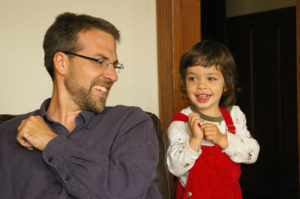Parents and Caregivers, We are thrilled to unveil our latest initiative – the Parenting ADHD…
The Daddy Brain
In honor of Fathers Day, I thought I would share this article from the Greater Good Center.
The Daddy Brain
By Jeremy Adam Smith | June 1, 2009 |
Moms aren’t the only ones whose bodies change after having a baby. Jeremy Adam Smith reveals the new science of fatherhood.
Gopal Dayaneni is a stay-at-home father in Oakland, California. He still recalls the first time he gave a bottle to his six-week-old daughter, Ila. “I sat down with her in a rocking chair,” he says. “She totally took the bottle, right up against my body, comfortable and warm. She looked up at me and I was so taken with her.”
This story has a punch line: “After that, she never took a bottle again,” says Gopal. “She screamed her head off every time I tried.”
As infants and toddlers, both of Gopal’s children cried when their mom, Martha, left for work as a teacher, cried when she came back, and talked about her all day in between. This made for some very difficult days. “They just love their mother more,” says Gopal ruefully.
“They just love their mother more,” says Gopal ruefully.
Famed anthropologist Margaret Mead would not have been surprised by Gopal’s situation. “Fathers are biological necessities, but social accidents,” she once said. Far from an eccentric view, Mead distilled a scientific consensus that prevailed for centuries and persists (as a matter of opinion) to this day: Men are natural conquerors—Lotharios and breadwinners—while women are natural nurturers. As a result, men want sex, women want babies, and babies want their mothers. According to this view, involved fathers are, at best, a happy accident.
For this reason, to many people Gopal’s reverse-traditional family might appear “unnatural,” a word that my desk dictionary defines as “contrary to the physical laws of nature” and my thesaurus says is synonymous with “abnormal,” “aberrant,” and “perverted.” When the children of a caregiving dad like Gopal cry out for their mother, many people would hold this up as evidence on behalf of what some call “the traditional family”—meaning, a breadwinning father and caregiving mother.
But the new science of fatherhood has started to cast Gopal’s dilemma in a new light. In researching my new book, The Daddy Shift, I read every word I could find in peer-reviewed scholarly journals about caregiving fathers, breadwinning moms, and the science of sexual difference. I also interviewed dozens of parents like Gopal and Martha.
Here’s what I discovered: Where once it was thought that the minds and bodies of men were hardly affected by fatherhood, today scientists are finding that fatherhood changes men down to the cellular level. For more than a century, it was assumed that mothers, not fathers, were solely responsible for the care, life chances, and happiness of children. In recent years, however, research has revealed that father involvement is essential to a child’s well being, and that dads provide unique kinds of care and play that mothers often do not.
As a result, scientists and parents alike are developing a radical new conception of fatherhood, one whose role is not limited to contributing sperm and making money. This should be a comfort to us all during a time of economic catastrophe, when 80 percent of people being laid off are men and tens of thousands of fathers are being thrown into new roles at home. Women have been supporting families for decades, taking on breadwinning roles that were once considered impossible. And after 30 years of research and growing male participation at home, we are now also beginning to understand that fathers can also take on roles as caregivers.
Brains of our fathers
In the past, says University of Oregon sociologist Scott Coltrane, researchers looked only at whether the father was present and married to the mother. They did not study how fathers interacted with their children or what impact fathers had on children’s development; no one studied how fatherhood might change a man’s brain and body.
But, says Coltrane, “in the late seventies researchers started saying, ‘Wait a minute, why don’t we measure what the fathers are actually doing? How do they parent?’”
In the decades since then, researchers have made a staggering number of discoveries about how critical father involvement is to child development, and how it can be cultivated. University of California, Riverside, psychologist Ross Parke is one of the pioneers of fatherhood studies. He and his colleagues developed a “systems view” that attempts to describe all the factors that influence a father’s involvement with his children:
- His relationships with his own parents (did he have an involved father?) and in-laws (are they supportive of him?);
- The mother’s attitude (does she welcome his participation?);
- Timing of entry into the parental role (what pressures is he facing, especially at work?); and
- Informal support systems such as playgroups and friendships (do other parents put social pressure on him to be involved, through example or comments?).
Read the rest of the article here.

This Post Has 0 Comments